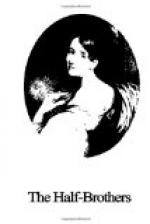At home I was the darling of my aunt, the tenderly-beloved of my father, the pet and plaything of the old domestics, the “young master” of the farm-labourers, before whom I played many a lordly antic, assuming a sort of authority which sat oddly enough, I doubt not, on such a baby as I was.
Gregory was three years older than I. Aunt Fanny was always kind to him in deed and in action, but she did not often think about him, she had fallen so completely into the habit of being engrossed by me, from the fact of my having come into her charge as a delicate baby. My father never got over his grudging dislike to his stepson, who had so innocently wrestled with him for the possession of my mother’s heart. I mistrust me, too, that my father always considered him as the cause of my mother’s death and my early delicacy; and utterly unreasonable as this may seem, I believe my father rather cherished his feeling of alienation to my brother as a duty, than strove to repress it. Yet not for the world would my father have grudged him anything that money could purchase. That was, as it were, in the bond when he had wedded my mother. Gregory was lumpish and loutish, awkward and ungainly, marring whatever he meddled in, and many a hard word and sharp scolding did he get from the people about the farm, who hardly waited till my father’s back was turned before they rated the stepson. I am ashamed—my heart is sore to think how I fell into the fashion of the family, and slighted my poor orphan step-brother. I don’t think I ever scouted him, or was wilfully ill-natured to him; but the habit of being considered in all things, and being treated as something uncommon and superior, made me insolent in my prosperity, and I exacted more than Gregory was always willing to grant, and then, irritated, I sometimes repeated the disparaging words I had heard others use with regard to him, without fully understanding their meaning. Whether he did or not I cannot tell. I am afraid he did. He used to turn silent and quiet—sullen and sulky, my father thought it: stupid, aunt Fanny used to call it. But every one said he was stupid and dull, and this stupidity and dullness grew upon him. He would sit without speaking a word, sometimes, for hours; then my father would bid him rise and do some piece of work, maybe, about the farm. And he would take three or four tellings before he would go. When we were sent to school, it was all the same. He could never be made to remember his lessons; the school-master grew weary of scolding and flogging, and at last advised my father just to take him away, and set him to some farm-work that might not be above his comprehension. I think he was more gloomy and stupid than ever after this, yet he was not a cross lad; he was patient and good-natured, and would try to do a kind turn for any one, even if they had been scolding or cuffing him not a minute before. But very often his attempts at kindness ended in some mischief to the very people




